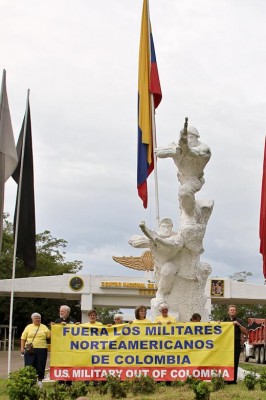 On August 3 and 4, eight U.S. human-rights activists demonstrated at the Tolemaida military base in Colombia. They were denouncing the U.S.-Colombia Defense Cooperation Agreement (DCA) signed last October, through which the United States plans to lease seven Colombian military bases for 10 years, including the one at Tolemaida.
On August 3 and 4, eight U.S. human-rights activists demonstrated at the Tolemaida military base in Colombia. They were denouncing the U.S.-Colombia Defense Cooperation Agreement (DCA) signed last October, through which the United States plans to lease seven Colombian military bases for 10 years, including the one at Tolemaida.
Holding a 12-foot banner demanding: “Fuera los Militares Norteamericanos de Colombia / U.S. Military Out of Colombia,” the demonstrators declared that the DCA “threatens Colombian sovereignty, militarizes the region, and poses a threat to neighboring countries.” They also lauded Colombian human-rights defenders and their “courageous, nonviolent work towards a good life for all Colombians.”
The U.S. “banneristas” — including me — represented SOA Watch, a nongovernmental organization working to close the U.S.-based Western Hemisphere Institute for Security Cooperation or WHINSEC (formerly the School of the Americas or SOA), where Latin American soldiers and police train in counterinsurgency tactics. Since 1946, more than 65,000 Latin Americans have trained at the SOA/WHINSEC, about 12,000 of them Colombian.
The State Department claims that the U.S.-Colombia agreement does not increase U.S. military presence in the country, but simply “facilitate(s) effective bilateral cooperation on security matters in Colombia.” However, an earlier U.S. Air Force document, presented to the U.S. Congress in May of 2009, explains that the Pentagon’s desire to upgrade the Colombian base at Palanquero ”provides an opportunity for conducting full spectrum operations throughout South America.” And Palanquero will help the United States “expand expeditionary warfare capability.”
Colombian activists believe that increased U.S. militarization will translate into increased abuses, especially in areas near the military bases. Human-rights defenders working on issues related to mass graves, particularly the one discovered near the La Macarena military base, see connections between U.S. military presence, human-rights abuses, and the extraction of gold, oil, and uranium by multinational corporations.
Their apprehensions are supported by the report “Military Assistance and Human Rights: Colombia, U.S. Accountability, and Global Implications.” Lead author John Lindsay-Poland and his colleagues discovered “alarming links between Colombian military units that receive U.S. assistance and civilian killings committed by the army.” They discovered that “many Colombian military units committed even more extrajudicial killings during and after the highest levels of U.S. assistance to those units.”
In good news for anti-base activists, the Colombian constitutional court ruled on August 17 that the DCA violates the Colombian constitution. In signing off on the DCA, President Alvaro Uribe bypassed the power of the Colombian Senate to allow or forbid the transit of foreign troops. The Washington Office on Latin America reports that U.S. soldiers and contractors already in Colombia aren’t affected by this decision, since they are covered by other accords. But the “full spectrum” upgrade at Palanquero is on hold, pending approval by the Colombian legislature, and progressive Colombian legislators will have their opportunity to argue that foreign troops cannot be stationed legally in Colombian national territory.
